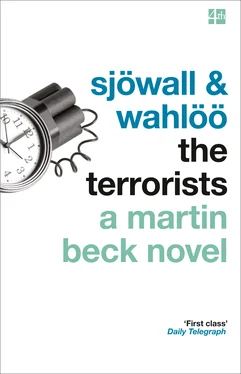MAJ SJÖWALL
AND PER WAHLÖÖ
The Terrorists
Translated from the Swedish by Joan Tate

This novel is entirely a work of fiction. The names, characters and incidents portrayed in it are the work of the authors' imagination. Any resemblance to actual persons living or dead, events or localities is entirely coincidental.
Fourth Estate
An imprint of HarperCollins Publishers Ltd. 1 London Bridge Street London SE1 9GF
www.harpercollins.co.uk
This ebook first published by Harper Perennial in 2009
This Fourth Estate edition published in 2016
This translation first published by Random House Inc, New York, in 1975
Originally published in Sweden by P. A. Norstedt & Söner Forlag
Copyright text © Random House Inc 1975
Copyright introduction © Dennis Lehane 2010
Cover photograph © Shutterstock
PS Section © Richard Shephard 2007
PS™ is a trademark of HarperCollins Publishers Ltd.
Maj Sjöwall and Per Wahlöö assert the moral right to be identified as the authors of this work
A catalogue record for this book is available from the British Library
All rights reserved under International and Pan-American Copyright Conventions. By payment of the required fees, you have been granted the non-exclusive, non-transferable right to access and read the text of this ebook on-screen. No part of this text may be reproduced, transmitted, down-loaded, decompiled, reverse engineered, or stored in or introduced into any information storage and retrieval system, in any form or by any means, whether electronic or mechanical, now known or hereinafter invented, without the express written permission of HarperCollins ebooks
HarperCollins Publishers has made every reasonable effort to ensure that any picture content and written content in this ebook has been included or removed in accordance with the contractual and technological constraints in operation at the time of publication
Source ISBN: 9780007243006
Ebook Edition © APRIL 2009 ISBN: 9780007323418
Version: 2017-07-25
From the reviews of the Martin Beck series:
‘First class’
Daily Telegraph
‘One of the most authentic, gripping and profound collections of police procedural ever accomplished’
MICHAEL CONNELLY
‘Hauntingly effective storytelling’
New York Times
‘There's just no question about it: the reigning King and Queen of mystery fiction are Maj Sjöwall and her husband Per Wahlöö’
The National Observer
‘Sjöwall/Wahlöö are the best writers of police procedural in the world’
Birmingham Post
Cover
Title Page
Copyright
Praise
Introduction
Chapter 1
Chapter 2
Chapter 3
Chapter 4
Chapter 5
Chapter 6
Chapter 7
Chapter 8
Chapter 9
Chapter 10
Chapter 11
Chapter 12
Chapter 13
Chapter 14
Chapter 15
Chapter 16
Chapter 17
Chapter 18
Chapter 19
Chapter 20
Chapter 21
Chapter 22
Chapter 23
Chapter 24
Chapter 25
Chapter 26
Chapter 27
Chapter 28
Chapter 29
Keep Reading
About the Authors
Also by Maj Sjöwall and Per Wahlöö
About the Publisher
As one might expect from a novel entitled The Terrorists , terrorism abounds in Maj Sjowall and Per Wahloo’s final Martin Beck police procedural. But the chaotic forms that terror takes are not simply that of the political assassinations that bookend the narrative (the first in Latin America, the second in Stockholm). Sjowall and Wahloo are after a much more expansive query of the very definition of terrorism. And so Martin Beck and his Murder Squad of disparate, contentious police officers don’t just engage an impending act of violent insurrection on the streets of Stockholm. They must also solve the murder of a wealthy pornographer and contend with the destruction of an eighteen-year-old naïf, Rebecka Lind, by the teeth of the social welfare system. All the while, their greatest enemy is not bullets or bombs, it’s the bureaucratic apparatus that exalts and rewards its own haplessness.
As this novel – the tenth in the series – is Martin Beck’s swan song, it’s worth noting that in the annals of realistic fictional policemen, Beck stands a full head above most. He carries plenty of psychic scars and admits to a depressive personality, but he’s not gloom laden to the point of masochistic self-pity that so often masquerades as a hard-boiled hero’s tragic worldview. Beck is a dogged worker bee entering his later middle-aged years with a healthy romantic life and no illusions about his place in the larger scheme of things. However exceptional, he is a civil servant. A great cop, yes, but in Sjowall and Wahloo’s vision, a great cop is little more than a great functionary in a hopelessly flawed system. Beck’s talents include ‘his good memory, his obstinacy, which was occasionally mule-like … his capacity for logical thought … [and finding] the time for everything that had anything to do with a case, even if this meant following up small details that later turned out to be of no significance.’ This is what makes a great cop – not the gun, not outsized emotion, not a need to tilt at windmills and otherwise rage against machines. That’s the writer’s job. The cop’s job is to persevere, to examine the evidence, collate the data, push the papers, and work the case to its end. Because what stands in the way of that approach – wholesale bureaucratic incompetence – is a constant in Sjowall and Wahloo’s Sweden of 1975. Any man who can push a vision of the truth, however colorless, however minuscule, through the thornbush of total systematic inefficiency, is a hero. And Martin Beck is that man. So much so that the icy, hypercompetent terrorist, Reinhard Heydt, finds it ‘incomprehensible that such a person would exist in a country like Sweden.’
Ah, yes, ‘a country like Sweden.’ One wonders how Sjowall and Wahloo managed to live there through the writing of the ten Martin Beck novels, so negative is their depiction of not just the failed welfare state but the physical landscape as well, a shameless myth of blonde goddesses and mineral springs that in reality gives birth every morning to a ‘dismal, dirty, gray and depressing dawn.’ It’s a late November world, compressed by a dark, swollen sky that hovers roughly four inches above your head until May. The courts don’t work, the schools produce little but rot, and the ruling class skims the cream off the top and turns its back as the poor fight over the coffee grounds.
Nowhere are the inequities of the system more heartbreakingly personified than in Rebecka Lind. Rebecka understands society so little that she walks into a bank and asks a teller for money because she’s heard banks give loans to those in need. She is not only turned down, she is arrested, and so begins her journey into the farcical justice system that Martin Beck works for. Rebecka, who ‘is not interested in politics other than that she finds society as such incomprehensible and its leaders either criminal or insane,’ is the novel’s holy fool and sacrificial lamb, cast adrift by a society that proclaims to care for her then preys upon her as soon as her isolation leads to financial need. Over the course of the novel, Rebecka will cross paths with Martin Beck and his girlfriend, Rhea, as well as with Walter Petrus, the soon-to-be-bludgeoned pornographer. The corpulent, impotent Petrus casts pubescent girls in skin flicks so low-budget sex, from film to film, takes place ‘on the same old couch, which occasionally changed covers.’ Petrus first hooks his ingénues on narcotics. Once they need the drugs and are willing to do anything to get their next fix, he reveals to them that ‘anything’ will involve having sex on film. While Rebecka Lind escapes his grasp (only to end up in the system’s callous grip), several children do not. The reader doesn’t need a map to spy the connections Sjowall and Wahloo draw between the type of terrorism in which Petrus traffics and that of both the ULAG assassins and the state.
Читать дальше













